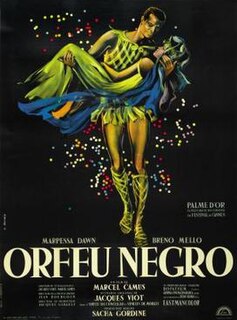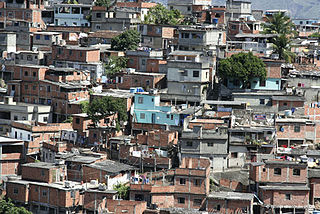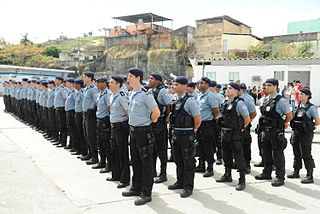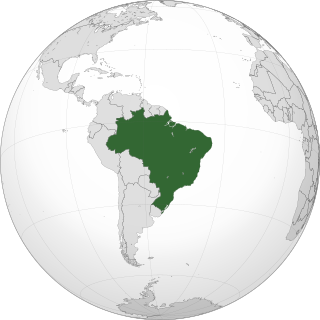
A favela is a type of slum in Brazil that has experienced historical governmental neglect. The first favela, now known as Providência in the center of Rio de Janeiro, appeared in the late 19th century, built by soldiers who had nowhere to live following the Canudos War. Some of the first settlements were called bairros africanos. Over the years, many former enslaved Africans moved in. Even before the first favela came into being, poor citizens were pushed away from the city and forced to live in the far suburbs. Most modern favelas appeared in the 1970s due to rural exodus, when many people left rural areas of Brazil and moved to cities. Unable to find places to live, many people found themselves in favelas. Census data released in December 2011 by the Brazilian Institute of Geography and Statistics (IBGE) showed that in 2010, about 6 percent of the Brazilian population lived in favelas and other slums. Favelas are located in 323 of the 5,565 Brazilian municipalities.

Cesar Epitácio Maia is a Brazilian politician, notable for having been elected three times for mayor of Rio de Janeiro.

Rocinha is the largest favela in Brazil, located in Rio de Janeiro's South Zone between the districts of São Conrado and Gávea. Rocinha is built on a steep hillside overlooking Rio de Janeiro, and is located about one kilometre from a nearby beach. Most of the favela is on a very steep hill, with many trees surrounding it. Around 100,000 people live in Rocinha, making it the most populous favela in Brazil.

Black Orpheus is a 1959 romantic tragedy film made in Brazil by French director Marcel Camus and starring Marpessa Dawn and Breno Mello. It is based on the play Orfeu da Conceição by Vinicius de Moraes, which is itself an adaptation of the Greek legend of Orpheus and Eurydice, set in the modern context of a favela in Rio de Janeiro during Carnaval. The film was an international co-production among production companies in Brazil, France and Italy.

Benedita Souza da Silva Sampaio is a Brazilian politician. From a humble background, she faced class and racial prejudice, overcoming it to become the first female and Afro-Brazilian governor of the State of Rio de Janeiro and, later, Minister of the said Secretary of State as well in the Government of Luiz Inácio Lula da Silva.
Kátia Lund is a Brazilian film director and screenwriter. Her most notable work was as co-director of the film City of God.
Funk carioca, also known as favela funk and, in other parts in the world, baile funk and Brazilian funk, is a hip hop style from Rio de Janeiro, derived from Miami bass and gangsta rap music.

Brazil ranks 49.3 in the Gini coefficient index, with the richest 10% of Brazilians earning 42.7% of the nation's income, the poorest 34% earn less than 1.2%.

Complexo do Alemão is a group of favelas in the North Zone of Rio de Janeiro, Brazil.

Crime in Brazil involves an elevated incidence of violent and non-violent crimes. Brazil possesses high rates of violent crimes, such as murders and robberies. Brazil's homicide rate is 30–35 homicides per 100,000 inhabitants according to the UNODC, placing Brazil in the top 20 countries by intentional homicide rate. Brazil is the country with the highest number of intentional homicides in the world, with 57,358 in 2018. In recent times, the homicide rate in Brazil has declined. The homicide rate was 23.6 per 100,000 in 2020 with 50,030 killings.
CUFA is a non-governmental organization in Brazil. Celso Athayde, a music producer and community organizer born in Favela do Sapo, founded the organization in 1999 with rapper and social activist MV Bill. Beginning Rio de Janeiro, Brazil, with a motto of "fazendo do nosso jeito”, it is dedicated to empowering the impoverished to identify and solve the social problems that affect them most, becoming their own best advocates for change instead of simply being assisted by government and non-profit programs.

The Morro da Babilônia is a hill in the Leme neighbourhood of Rio de Janeiro, separating Copacabana beach from Botafogo. It is home to a favela known by the same name, as well as the favela Chapéu Mangueira. Morro da Babilônia is an environmentally protected area.

The Military Police of Rio de Janeiro State (PMERJ) like other military polices in Brazil is a reserve and ancillary force of the Brazilian Army, and part of the System of Public Security and Brazilian Social Protection. Its members are called "state military" personnel.

The Pacifying Police Unit, abbreviated UPP, is a law enforcement and social services program pioneered in the state of Rio de Janeiro, Brazil, which aims to reclaim territories, most commonly favelas, controlled by gangs of drug dealers. The program was created and implemented by State Public Security Secretary José Mariano Beltrame, with the backing of Rio Governor Sérgio Cabral. The stated goal of Rio's government is to install 40 UPPs by 2014. By May 2013, 231 favelas had come under the UPP umbrella.
Viva Rio, a nongovernmental organization based in Rio de Janeiro, Brazil, was founded in December 1993 to combat the growing violence in the city. The organization has expanded into a multinational organization with a goal “to promote a culture of peace and social development through field work, research and formulation of public policies”. Its mission statement is “to integrate a divided society and develop a culture of peace, integrating with civil society and public policies, working at grassroots and internationally through: designing and testing solutions to social problems, consultancies, advocacy, training, campaigns, communication”.

Maria das Graças Foster, commonly known as Graça Foster, is a Brazilian business executive and chemical engineer. She was the CEO of Petrobras-Petróleo Brasil, Brazil's state-controlled oil company, which is located in Rio de Janeiro. She was the first woman in the world to head a major oil-and-gas company. In April 2012, she was listed on the Time 100 list of the most influential people in the world. In 2014, she was recognized as the 16th most powerful woman in the world by Forbes Magazine. She was ranked by Fortune magazine in 2013 as the Most Powerful Woman in Business for the second year in a row.
On July 14, 2013, Amarildo de Souza, a 43-year-old bricklayer from the Rocinha favela in Rio de Janeiro, Brazil, was called in for questioning by Unidade de Polícia Pacificadora (UPP) officers on his way home from the market. Believed to be connected to drug trafficking activity in the favela despite having no prior involvement in illegal activity, de Souza was brought in for questioning during Operation Armed Peace, during which roughly 300 officers from Rocinha's UPP force flooded the favela in order to arrest drug traffickers. It was during this two-day long raid that de Souza was brought to the police station and never seen again.

Marielle Franco was a Brazilian politician, sociologist, feminist, socialist, and human rights activist. After earning a master's degree in public administration from the Fluminense Federal University, she served as a city councillor of the Municipal Chamber of Rio de Janeiro for the Socialism and Liberty Party (PSOL) from January 2017 until her death.
Catalytic Communities (CatComm) is a Rio de Janeiro-based non-profit, think tank, and advocacy non-government organization (NGO) that conducts work in sustainable community development, human rights, communications, and urban planning. It is "one of the first online initiatives to share solutions to civic and social problems." Founded in 2000, the organization has been recognized in media news outlets, academic publications, and local communities for their work. Its stated vision is to "leverage social media, provide community training, and advocate for participatory planning and pro-favela policies with the long term goal of realizing the potential of Rio de Janeiro as a true example of inclusive urban integration".

Squatting in Brazil is the occupation of unused or derelict buildings or land without the permission of the owner. After attempting to eradicate slums in the 1960s and 1970s, local governments transitioned to a policy of toleration. Cities such as Recife, Rio de Janeiro and São Paulo have large informal settlements known as favelas. A more recent phenomenon is the occupation of buildings in city centres by organised groups. In rural areas across the country, the Landless Workers' Movement (MST) arranges large land occupations.














